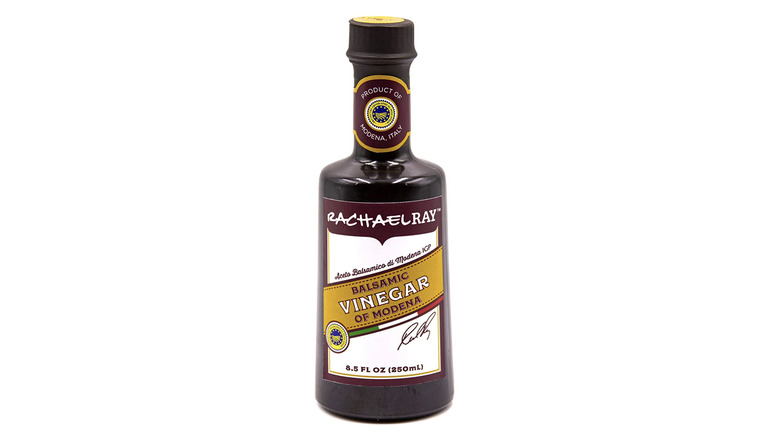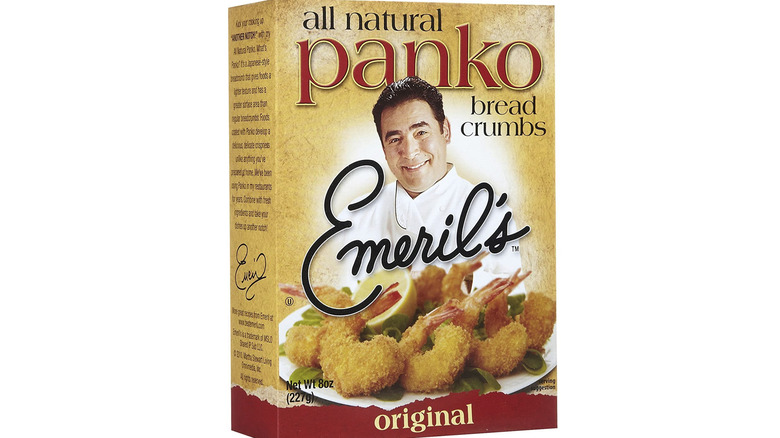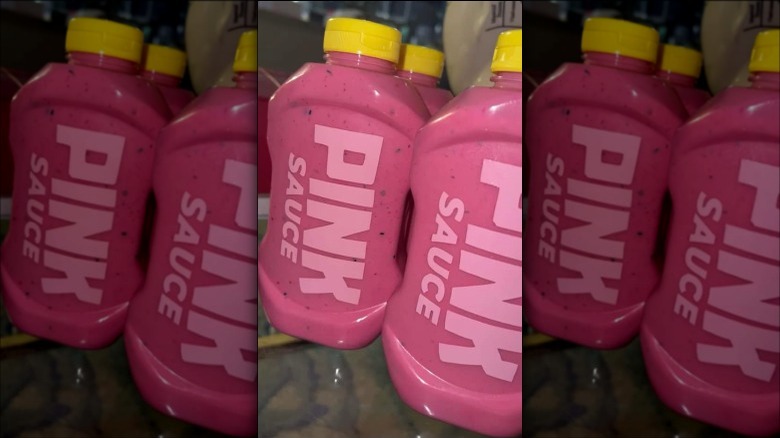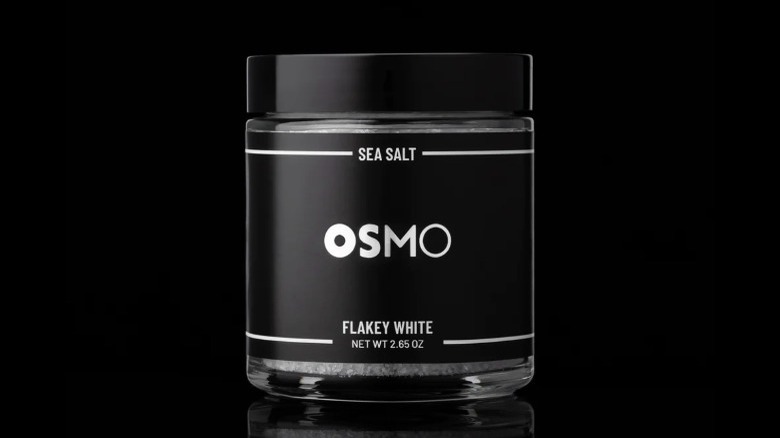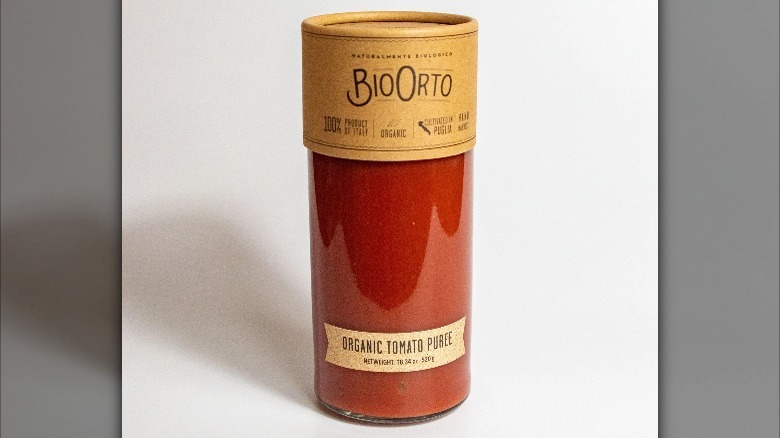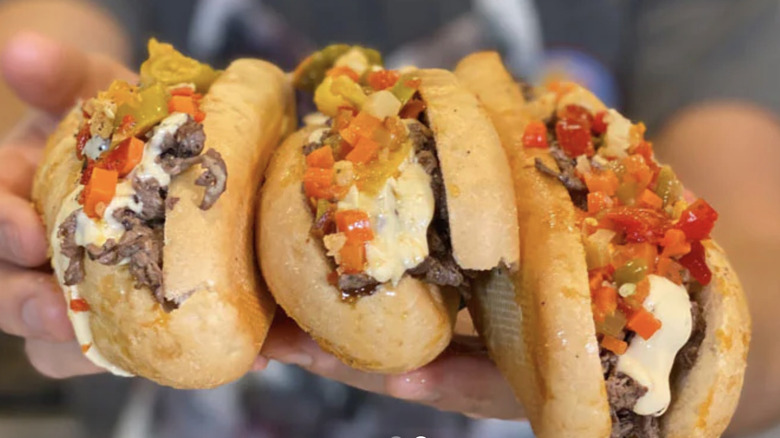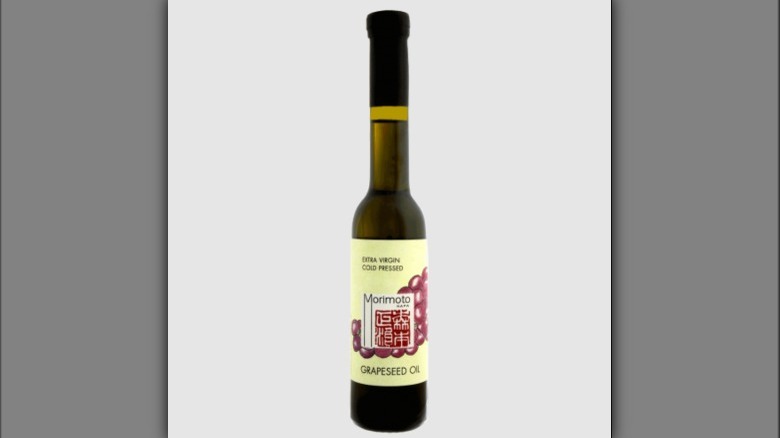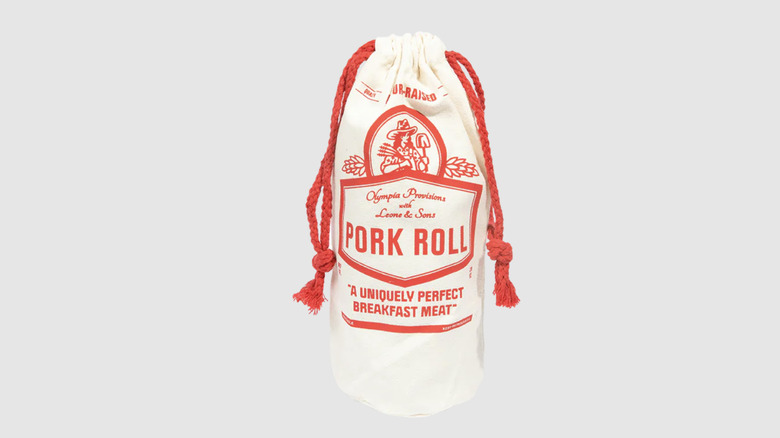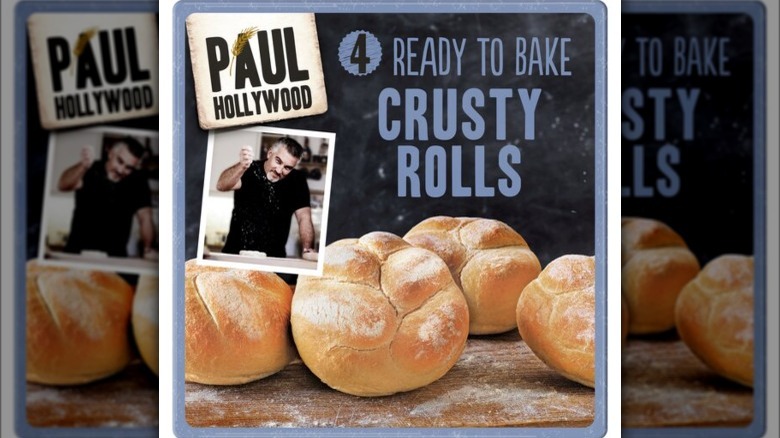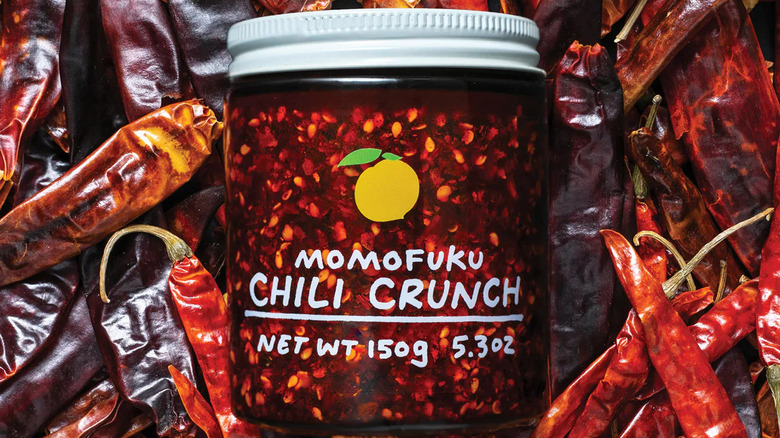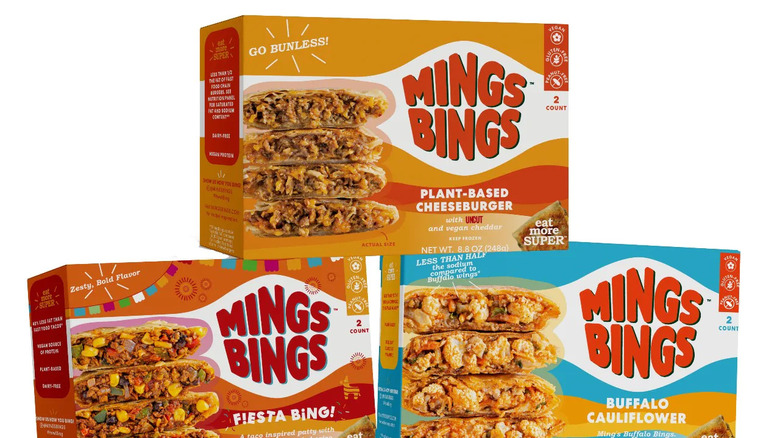11 Celebrity Chef Grocery Products That Are A Waste Of Money
We love celebrity chefs. They teach us how to cook, and they tell us about new and exciting foods we should be eating. Without them, American food culture would be a lot more boring than it is today. However, that doesn't mean celebrity chefs can do no wrong. Like all celebrities, they enjoy money — and sometimes, that love of money can lead them to endorse products that cost too much for what they deliver. We admire the hustle, and everybody has to get paid, but that doesn't mean that grocery consumers should be played as suckers.
Not every chef-endorsed grocery product is a waste of money, but we didn't have much trouble coming up with enough examples to fill out this list. From TikTok stars to television personalities, we've collected a range of food celebrities who are hawking products that are overpriced, not good, or both. We hope that with this information, you can arm your wallet the next time you're in the grocery store or looking for pantry items online.
1. Rachael Ray balsamic vinegar
To understand this product, you have to first know a little bit about balsamic vinegar. Two common labels you'll find on balsamic vinegar (and other Italian products) are IGP and DOP. Per Italian Delights, DOP means protected designation of origin, while IGP means protected geographical indication. In general, DOP products meet a more stringent standard for keeping all production within a certain traditional geographic territory. In the case of balsamic vinegar, the two designations refer to two very different products.
The classic way of making balsamic vinegar involves taking acidified grape must and aging it in wooden barrels. In order to be labeled DOP, the vinegar needs to be aged for at least 12 years. This type of vinegar is complex, difficult to make, and expensive. Rachael Ray's balsamic vinegar is labeled IGP, which means it's made with a small amount of aged vinegar mixed in with relatively young vinegar and a little bit of caramel (via Aroma Balsamico). It's made in Modena, the traditional home of balsamic, but other than that, it's normal, modern balsamic vinegar like you can buy in any grocery store, as the Amazon reviews attest.
While Rachael Ray's balsamic isn't bad by any means, you can get a comparable IGP balsamic vinegar of Modena from Walmart that's half the price for a bottle twice the size.
2. Emeril's panko
One running theme on this list is that the products themselves aren't bad, but the celebrity chefs who are endorsing them are using their famous names to inflate the prices of normal foods. That is the case with Rachael Ray's balsamic vinegar, and it's true of Emeril's panko bread crumbs as well.
Emeril Lagasse is a great chef, so we don't think he would put his name on garbage. We're not entirely sure why a guy who grew up in New England and got famous for cooking Cajun/Creole food is selling Japanese-style bread crumbs, but they seem like a good product judging by the Amazon reviews. However, they're just too expensive for what they are: plain bread crumbs. We know that panko are the fancy crumbs and they're a little more complicated to make (they're baked with electricity), but how good can bread crumbs possibly be?
Emeril is selling these things for $7 for a half-pound box at the time of writing. The fanciest-looking panko at Target is $3.49 for a 12-ounce bag. It's not like you're getting any of Emeril's trademark award-winning Louisiana flavor in this box of shards of dried bread.
3. Chef Pii's pink sauce
Remember what we mentioned about most of these products being good? That doesn't apply to this one. TikTok's viral pink sauce is the creation of Chef Pii, a Miami-based private chef. It's a creamy dressing made with oil, chili pepper, garlic, honey, and some other seasonings. It gets its lurid, TikTok-ready pink hue from dragonfruit. We're not exactly sure that the world was clamoring for fruity mayo to drizzle on chicken strips, but we're not TikTok food influencers, so what do we know?
Chef Pii sold her concoction for $20 straight to her fans without approval from the FDA. While that might seem shady, it's potentially legal under Florida's Cottage Food laws, which allow entrepreneurs to make and sell food from their home kitchens as long as it's not going to make anyone sick. About that last part: Chef Pii was shipping the product without any refrigeration, and while it was supposed to be shelf-stable, some customers claimed it made them sick (via Vice).
To be fair, at least one reported illness turned out to be a hoax, and Chef Pii insisted that she followed the proper regulations. Nevertheless, the hullaballoo damaged the sauce's reputation and you can't buy it right now. However, the pink sauce website now has a video in which Chef Pii promises (threatens?) to be coming out with a commercially-made version of the product in partnership with Dave's Gourmet. Our advice? Stay away, especially if the new version is still $20.
4. Nick DiGiovanni's Osmo salt
Famous TV chefs aren't immune from charging a few extra bucks for the products they endorse, but the most egregious scammers reside on TikTok. Nick DiGiovanni's Osmo salt might not give you stomach cramps like pink sauce, but it will leave your wallet feeling noticeably emptier.
If you're not familiar with DiGiovanni, his first brush with fame came from appearing on "MasterChef," but he became a superstar on the internet, with millions of followers on his TikTok and YouTube pages. He has legions of fans, which might be why he thinks he can get away with charging $13.99 for a 2.65-ounce jar of Kosher salt.
Yes, that's right: Kosher salt, the same stuff you can buy a 3-pound box of for $7 at the Webstaurant Store. We did a little math and found that Osmo Kosher salt is over 36 times more expensive by weight than Diamond Crystal Kosher salt. Osmo isn't exactly the same as Diamond Crystal; unlike its cheaper competitor, it's sea salt that's harvested by hand from the Pacific Ocean. Even so, this doesn't seem like particularly special salt. It doesn't have trace minerals like Himalayan pink salt. It's not smoked. It's just normal, salty-tasting salt. Even Osmo's website seems to be having trouble saying what makes it special: It describes both the flavor and texture as crunchy. Is crunchy a flavor now?
5. Giada de Laurentiis' Bio Orto passata
Bio Orto passata is sold by Giadzy, which is Giada de Laurentiis' online food store. According to the site's about page, Giada started the company because she wanted to make special, artisanal, high-quality Italian ingredients available in America. She's particularly passionate about products that express the unique character of their terroir.
At first glance, the passata from Bio Orto seems to check off all those boxes. It's organic, it's made with tomatoes from Puglia in Southern Italy, and it's bottled in glass to avoid the metallic flavor you sometimes get in canned tomato products. That all adds up to a premium product that would justify a premium price — in this case, $11.50 for an 18-ounce jar.
But wait, what is passata anyway? With that fancy Italian name, it sounds like some kind of pasta sauce, perhaps something traditional to Puglia, where the tomatoes are from. Well, not exactly. It turns out that passata is more like something you'd use to make your own pasta sauce recipe: It's just pureed tomatoes and salt. $11.50 for artisanal pasta sauce seems reasonable, but $11.50 for tomato puree is a bit of a stretch. You can get a larger jar of fancy organic Italian passata for less than $4 from Piccolo's Gastronomia Italia. Bio Orto would have to be life-changingly good to justify its price.
6. Jeff Mauro's Chicago cheesesteak kit
Food Network's Sandwich King, Jeff Mauro, has had his hands in a lot of different pies (sandwiches?) since he won Season 7 of "Food Network Star." He got his own cooking show called, of course, "Sandwich King," and he's one of the hosts of "The Kitchen" (via Food Network).
In addition to his career on the small screen, Mauro runs a business called Mauro Provisions, which focuses on sandwich kits and giardiniera, an Italian-style pickled vegetable mix that often appears on sandwiches.
We could select a few of Mauro Provisions' offerings to be featured on this list, but the one that strikes us as giving you the least bang for your buck is the Chicago cheesesteak kit. First off, a Chicago cheesesteak isn't really a thing you hear much about. By Mauro's definition, it seems to be a Philly cheesesteak with giardiniera added to it, which does actually sound kind of good. However, for the princely price of $109 (plus shipping), Jeff Mauro sends you the ingredients for ... six cheesesteaks. That works out to $18 per sandwich, and you have to cook your own beef.
At Pat's King of Steaks in Philly, you can get a cheesesteak for $14.50, and you don't have to do any work yourself. Some of Mauro's other offerings justify their high prices by giving you fancy ingredients like USDA Prime beef or filet mignon, but the cheesesteak kit's two pounds of Angus ribeye don't cut it for over $100.
7. Masaharu Morimoto's grapeseed oil
We are not here to cast aspersions on Masaharu Morimoto as a chef. Anyone who's watched him compete on "Iron Chef" knows that he has a jaw-dropping set of culinary skills, and his restaurant career is just as impressive. But if you're paying for something with the Morimoto imprimatur you know that you're throwing budgetary concerns out the window. That might be worth it for a meal at one of his restaurants, but some of his packaged goods are a little more questionable.
First off is his grapeseed oil, which costs $17 for a 200-milliliter bottle. When you think of grapeseed oil, the first thing that comes to mind might be the refined stuff, which is a neutral oil that's good for high-heat cooking (via Martha Stewart). Refined grapeseed oil is relatively cheap, but that's not what Morimoto is selling. His grapeseed oil is cold-pressed, which means it has a fuller flavor. Even so, you can get massive jugs of cold-pressed virgin grapeseed oil on Amazon for a fraction of the price per ounce that Morimoto is charging.
We also want to include an honorable mention for Morimoto's shichimi togarashi, a mildly spicy Japanese spice blend. At $12.49, it's not ludicrously expensive for a premium spice mix, but the customer reviews are full of complaints about this blend, which replaced a different mix that people liked more.
8. Brad Leone's pork roll
If you're not familiar with pork roll (also known as Taylor ham), you probably grew up far away from New Jersey. This tubular, pink breakfast meat is the pride of the Garden State. It's a finely-textured, super salty, mildly tangy smoked sausage that's usually thinly sliced, griddled, and served in a breakfast sandwich. It's super tasty, but it's also no one's idea of fancy; it's an industrially-made breakfast meat.
Leave it to Bon Appétit test kitchen star and proud son of New Jersey Brade Leone to develop a gourmet version of this cylindrical mystery meat. His Leone & Sons pork roll is a collaboration with Olympia Provisions, a charcuterie company based in (check notes) ... Portland. Portland may be super far from New Jersey, but we guess that doesn't disqualify the company from making good pork roll.
Judging by the user reviews, this pork roll is a high-quality product. Intriguingly, the Olympia Provisions website doesn't show you how much the pork roll costs until you put it in your cart. Perhaps that's to try to avoid sticker shock, because this 20-ounce log of meat costs $57. A 1-pound sack of classic pork roll goes for $10.49. Maybe Leone & Sons pork roll truly is the greatest breakfast meat ever produced, but even if it is, we'd stick with the OG Taylor version for most of our breakfast needs. It's already more than tasty enough.
9. Paul Hollywood crusty rolls
Whatever you think of Paul Hollywood as a person, he's undeniably an incredibly skilled baker. "The Great British Bake Off" host is an endless resource of knowledge about pastries and bread. But does his expertise translate to his packaged, ready-to-bake rolls?
Judging by the user reviews, the results are mixed. These rolls have plenty of five-star reviews, but the average is 3.5 stars, which is pretty mediocre for a product from Britain's preeminent baking expert. According to several dissatisfied customers, these rolls turn out doughy and unpleasant when prepared as per the instructions on the package. One person said, "After following the heating instructions to the letter, the outer surface was slightly crusty, but the inside was very doughy." Another customer had a similar experience, saying "they were very small and a weird shape. I cooked them exactly as per the pack instructions and they came out rock hard on the outside and still a bit raw in the middle." Some people even say the generic supermarket brand rolls are better.
One thing we can say in these rolls' favor is that they're not as preposterously expensive as some other items on this list. They're £1.80 for a four-pack, or about $2 at the time of writing. However, you'll find people complaining about the value as well, with one reviewer noting that six rolls used to come in a pack that was the same price.
10. Momofuku chili crunch
David Chang's Momofuku restaurant empire now has a packaged products division. It sells a range of fancy versions of Asian grocery products like instant noodles, soy sauce, and rice vinegar. The Momofuku shop also sells three flavors of chili crunch, a riff on the ever-popular chili crisp condiment.
The standard Momofuku chili crunch costs $13, while the classic Lao Gan Ma version from China can be purchased for $5 from World Market for a larger jar. The Momofuku version is made with fancier ingredients, including arbol and puya chilis, mushroom powder, and seaweed, so that might justify the cost for some people. It also doesn't contain MSG, which could be a selling point. However, we've had a chance to sample both Momofuku's version and Lao Gan Ma's, and we have to say, David Chang's chili crisp is a little bit underwhelming. It lacks the umami punch that the Lao Gan Ma gets from fermented beans and MSG.
Also, the Momofuku product is labeled as "chili crunch," which would lead you to believe it's even crunchier than Lao Gan Ma, but the opposite is true. Lao Gan Ma is filled with delightful chili chips, while Momofuku chili crunch has a texture more reminiscent of chili oil. If you're really scared of MSG, the Momofuku chili crunch might be worth it, but for everyone else, it's a useless splurge on a less tasty product.
11. Ming's Bings
This product from TV host and restaurateur Ming Tsai is a little harder than the some on this list to compare to other, similar products, as there don't seem to be a ton of frozen bings on the market. For the uninitiated, many types of Chinese bread can be referred to as a bing, but one type is a thin crepe or flatbread that is often wrapped around fillings to make a popular street-food sandwich (via That's). Ming's Bings are frozen flatbread sandwiches filled with some decidedly non-traditional toppings, including Buffalo cauliflower, Fiesta, and plant-based cheeseburger.
This is a unique product on the marketplace, so that makes it valuable in some way, but is it worth $74.99 for a 12-pack? That's over $6 per bing, which is a lot to pay for what is, at the end of the day, a frozen snack food. These bings aren't meal-sized; one cheeseburger bing has only 290 calories, which isn't enough to fill most people up. Now $74.99 will buy you a lot of frozen burritos or dumplings, and we're not sure the novelty of the bing format justifies the price.

